Over 30 years of anarchist writing from Ireland listed under hundreds of topics
Household Tax- planning to win - democracy is the key
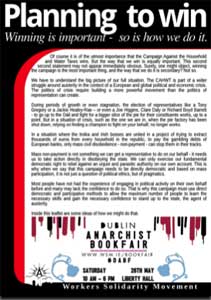 The National Conference of the Campaign Against the Household and Water Taxes in May made some key decisions. The ultimate objective of our campaign should be to ensure that everyone who gets involved in it can have an equal input into our decision-making. This will make for a more democratic and far more efficient Campaign which large numbers of people will feel direct ownership of. That will mean a far stronger Campaign and one capable of winning. On Saturday we distributed this text which explains the case for direct democracy as a leaflet to those attending the conference.
The National Conference of the Campaign Against the Household and Water Taxes in May made some key decisions. The ultimate objective of our campaign should be to ensure that everyone who gets involved in it can have an equal input into our decision-making. This will make for a more democratic and far more efficient Campaign which large numbers of people will feel direct ownership of. That will mean a far stronger Campaign and one capable of winning. On Saturday we distributed this text which explains the case for direct democracy as a leaflet to those attending the conference.
Winning is important. So is how we do it
Of course it is of the utmost importance that the Campaign Against the Household and Water Taxes wins. But the way that we win is equally important. This second statement may not appear immediately obvious. Surely, one might object, winning the campaign is the most important thing, and the way that we do it is secondary? Not so.
We have to understand the big picture of our full situation. The CAHWT is part of a wider struggle around austerity in the context of a European and global political and economic crisis. The politics of crisis require building a more powerful movement than the politics of representation can create.
During periods of growth or even stagnation, the election of representatives like a Tony Gregory or a Jackie Healey-Rae – or even a Joe Higgins, Clare Daly or Richard Boyd Barrett - to go up to the Dáil and fight for a bigger slice of the pie for their constituents works, up to a point. But in a situation of crisis, such as the one we are in, when the pie factory has been shut down, relying on finding a champion to fight on your behalf, no longer works.
In a situation where the troika and Irish bosses are united in a project of trying to extract thousands of euros from every household in the republic, to pay the gambling debts of European banks, only mass civil disobedience - non-payment - can stop them in their tracks.
Mass non-payment is not something we can get a representative to do on our behalf - it needs us to take action directly in disobeying the state. We can only exercise our fundamental democratic right to rebel against an unjust and parasitic authority on our own account. This is why when we say that this campaign needs to be directly democratic and based on mass participation, it is not just a question of political ethics, but of pragmatics.
Most people have not had the experience of engaging in political activity on their own behalf before and many may lack the confidence to do so. That is why this campaign must use direct democratic and participative methods to allow the maximum number of people to learn the necessary skills and gain the necessary confidence to stand up to the state, the agent of austerity.
Below are some ideas of how we might do that
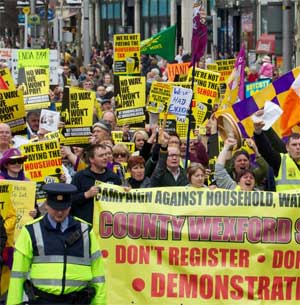 Direct Democracy
Direct Democracy
Most politics is based on representative democracy whereby somebody is elected to represent an area and makes the decisions that s/he thinks are best for the area. In reality, however, that politician usually ends up making decisions based on her/his political views rather than on the views of the people, and the rest of us have little or no input into the decisions.
What ultimately happens in representative democracies – as we have seen again and again in Ireland and elsewhere – is that people are elected to government on one platform but what they call ‘political or economic reality’ leads them to implement a completely different set of policies.
These ‘political or economic realities’ are usually dictated by the powers that be - the financial markets, those that have economic muscle in society.
Nobody really believes that in a representative democracy all views are equal. That’s why we need a different type of democratic structure on which to build our campaign. We need a structure which does value all views equally and which ensures that all members of the campaign are enabled and supported in having an input into the decision making structures of the campaign.
This is what we mean when we refer to “direct democratic and participative methods”. The central tactic of our Campaign is non-payment – that immediately involves everyone in direct participation. Nobody can ‘not pay’ on your behalf. That direct participation needs to be backed up by allowing maximum direct participation in the decision-making structures of the campaign – at both local and national level.
Locally
Local groups should exist in every area. The group should hold regular meetings which are openly advertised and which all non-payers in the area are welcome to attend. These meetings should decide the tactics of the campaign at a local level. That’s relatively straightforward but to truly enable and support people who have never been involved in political campaigns before, there is an onus on more experienced activists to encourage and assist less experienced people to contribute to the decision making process.
Simple things like ensuring that everyone introduces themselves at the start of the meeting so that everyone knows everyone else, that the meeting chair/facilitator encourages contributions from everyone and tries to ensure that the meeting is not dominated by a small number of people are important. These help to develop people’s confidence.
When there is a task to be done e.g. write a new leaflet, design a poster, make phone calls to members to let them know about a forthcoming picket… it is again important that less experienced people are given the opportunity to contribute to doing these jobs. This is often the hardest bit.
For handiness and efficiency it’ll be quicker to get a leaflet written, for example, if the same person who has done it before does it. But if we see part of the role of the Campaign as being to develop people’s confidence and skill base, then it would be important that the more experienced campaigner says to someone else or a couple more people ‘Will you help me to write that leaflet’.
The less experienced person may need a bit of persuasion/encouragement but it is important that we do this. Not alone do we eventually greatly expand the number of people in our Campaign group with certain skills, we also make people feel more part of the Campaign and thus will encourage greater participation.
At a local level, we should also try to rotate positions within the Campaign group – chairing of meetings, taking minutes, doing secretarial work etc. this avoids a situation where a small number of people begin to think of themselves as the ‘leaders’ and contributes to everyone feeling that their input is of equal value.
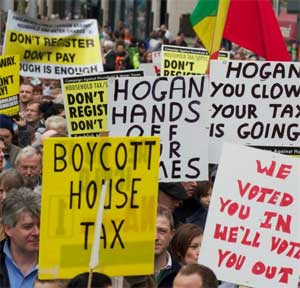
Regional & national decision-making
Because our Campaign is a national one, we need to be able to make decisions on a regional and national basis. And, if we are trying to build our Campaign along participative democracy lines, we need to be able to involve as many people as possible in the decision making process.
This can be done through a delegate system whereby delegates from local groups meet regularly on a regional basis and delegates from the regional groups do likewise nationally. It is important that we are clear about what a delegate is – and just as importantly what s/he isn’t. Because we want to do things in a direct/participative way rather than in a representative way, it would be wrong to simply elect a number of people to represent the local campaign regionally and trust that they will reflect the views of the local campaign.
Instead what is needed is that the regional and national meetings take place regularly and that the agenda and items for discussion are circulated beforehand, thus allowing local groups to discuss them. Following discussion at a local level a decision is made (with a vote taken if necessary). The delegates then bring the group’s decision to the regional/national meeting.
The big difference between someone being a delegate from and a representative of a local group is that the delegate must bring the group’s views – irrespective of what her/his own opinion is.
This process can be refined even further. If an issue is controversial and/or if the vote taken at the local group is tight the delegates could, for example, bring to the meeting that ‘60% of our meeting were in favour and 40% against’.
It’s pretty straightforward really. If the local group gets used to talking things out, listening to everyone and then making a definite decision, it makes the task of the delegates bringing the meeting’s views relatively easy. As with the other roles above - and for the same reasons - it’s a good idea to share out the job of delegate.
And, of course, if any delegate doesn’t carry out the wishes of the local group or misrepresents the views of the meeting s/he can be removed and not entrusted with the role again.
Urgent decisions
Issues will of course arise for decision at regional/national meetings for which no mandate has been given – although if a real effort is made to respect democratic principles and follow agreed procedures, these should be relatively uncommon. In such circumstances, the delegates should attempt to as best as possible reflect what they think the views of the local campaign would be. And should go back to the next meeting of the local campaign to have their position ratified.
At a national level, it is necessary that a number of people are mandated to make decisions on day-to-day issues that will arise between meetings of the national co-ordinating/steering committee. It’s important that any such decisions are made in accordance with agreed campaign policy, and that they are presented to the next meeting for ratification.
This again prevents a ‘leadership’ emerging which usurps control over the campaign’s decision-making.
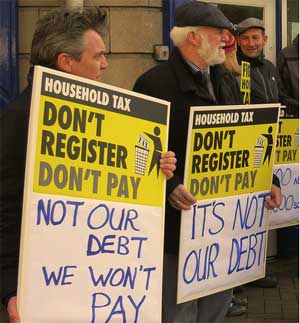 The Big Picture
The Big Picture
The ultimate objective of our campaign should be to ensure that everyone who gets involved in it can have an equal input into our decision-making. This will make for a more democratic and far more efficient Campaign which large numbers of people will feel direct ownership of. That will mean a far stronger Campaign and one capable of winning.
And in the process of winning, those large numbers of people will have learnt a great deal about how to organise and will have developed skills and confidence which they will be able to use in other campaigns – campaigns in which they will be the ‘more experienced’ activists sharing those skills with people who haven’t been involved before.
Our political system of representative democracy is failing us. As a people and as a society we need to begin to imagine alternative ways in which society can be organised – ways in which the ideals of freedom, equality and true democracy can be the building blocks for a new way of living. Through our involvement in campaigns such as the CAHWT we can learn the skills and have the discussions that can equip us to go on and build that new society.
We don’t need anyone to do it for us. Let’s do it for ourselves!
Who we are
This leaflet is produced by the Workers Solidarity Movement (WSM). We are an anarchist organisation with branches in Dublin, Cork and Galway and members in a number of other towns and cities. Members of the WSM have been active in the CAHWT since its inception. We have been involved on the interim steering committee, and our members are active in their local campaign groups.
We hope that the ideas in this leaflet about how we feel the campaign should be built will be useful to local campaign groups and to members and activists of the campaign.
If you like what you’ve read and would like to know more about the WSM and anarchist politics, why not visit our website www.wsm.ie or look out for our paper Workers Solidarity or our magazine Irish Anarchist Review
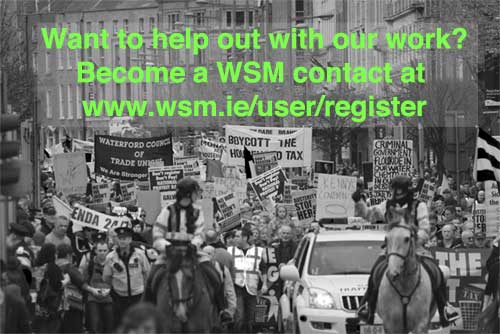
| Attachment | Size |
|---|---|
| PDF of this text arguing for direct democracy in the Household Tax campaign | 1.15 MB |

